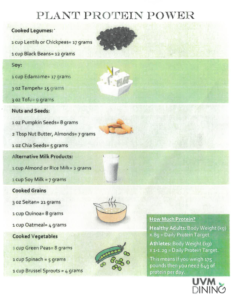Explainer: Specialists urge anyone restricting their consumption of meat to research nutritional values
by Liam Robinson
Plant-based diets like vegetarianism and veganism have been increasing in popularity with many seeing it as a healthier option than including meats and other animal products in their meals. However, MyPlate, an organization of nutrition experts based out of the USDA, cautions anyone looking into these options to factor in the basic caloric and nutritional needs of their bodies before cutting out vital nutrients.
Nearly 3% of Americans are following a plant-based diet, according to a 2017 Harris National Poll; an estimated 3 million people in total. Many see cutting meat out of their diet as a healthy way to cut down on calories and reduce the risk of heart disease as red meats can contribute to higher cholesterol and increased coronary problems. But these practices can create other dietary problems in people.
Doctor Philippe Chauveau, an internationally recognized dialysis expert, notes that when cutting out meat our bodies react primarily in the kidneys. A buildup of phosphate, insulin resistance, and uremic acids due to lowered efficiency in kidney function can cripple the organ entirely. Chauveau’s studies on the effects of vegetarianism specifically have shown that the risk of chronic kidney failure increases by 19% in those with a plant-based diet.

(Photo: UVM Dining)
Rebecca Hunt, dietitian for FPU Sodexo, says that the vegetarian options that are provided on campus are popular, however the menu does in fact switch between vegan and vegetarian most days. “It is important that students know what nutrients they aren’t getting from their current diet, a range of important minerals like zinc and potassium are not found in high enough quantity, or at all in some cases, in plants so you need supplements,” said Hunt.
Senior Kassandra Jaskolski has regularly promoted veganism throughout her years at the school, not only for its beneficial health effects, but also for the positive effects that a lowered societal dependency on meat would have on the planet. “I got a lot of information through school, personal research, and my doctor about how to make sure I was getting the right nutrients, so it never really was an issue for me,” said Jaskolski.
One of the most important things that come from a meat-based diet is vitamin B12, an important tool in the bloodstream that transports oxygen around the body and distributes iron. Vegetarians need to take multivitamins and ensure that communication with their doctors or nutritionists are regular and thorough.
For further information Rebecca Hunt says students can email her concerns or questions at Rebecca.Hunt@Sodexo.com,. Sites like the ChooseMyPlate.gov have verified and up-to-date information on nutritional balancing and what diets will need additional nutrients. There are also many doctors on this and sites like vrg.org (Vegetarian Resource Group) who provide information and tips to stay healthy while following a diet based primarily on plants.



Well done Liam.